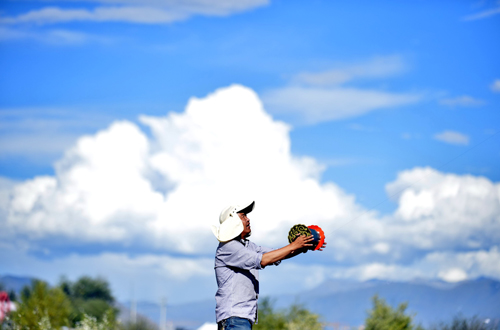|
 |
|
FLY IN THE SKY: A man flies a kite on the bank of the Lhasa River in Lhasa, capital of China's Tibet Autonomous Region, on September 19. Kite lovers there have a tradition to "fight kites" on the bank of the river from August to October every year (XINHUA) |
Law on Terrorism
China has issued a judicial explanation to clarify application of its criminal law on terrorism.
The document, which was issued to all provincial judicial and prosecuting apparatus and public security authorities, was jointly formulated by the Supreme People's Court (SPC), the Supreme People's Procuratorate (SPP) and the Ministry of Public Security (MPS) on September 9, and was published on the MPS website on September 21.
The document urges authorities to differentiate normal religious activities from religious extremism and terrorism, and protect freedom of religion. It is the latest judicial explanation released by the SPC or SPP to clarify legal procedures when dealing with terrorism.
The SPP said earlier in September that prosecutors should fast-track cases involving terrorists, religious extremists and manufacturers of firearms and explosives.
Criminal Crackdown
China has apprehended 18,000 suspects in over 14,000 criminal cases concerning intellectual property rights (IPR) infringement this year so far, according to the Ministry of Public Security (MPS) on September 21.
The MPS stepped up its efforts against IPR violations in 2011, and has cleared a total of 127,000 cases. It has uncovered and destroyed more than 1,400 dens for manufacturing, marketing and distributing counterfeit products since 2013.
The MPS also briefed the public about 10 recent IPR cases.
In March, a workshop manufacturing fake and poor-quality sanitary napkins worth 36 million yuan ($5.86 million) with eight production lines was closed by the public security departments of China's Fujian, Sichuan, Zhejiang and Hunan provinces.
In May, a criminal network selling fake cosmetics online under international brand names including L'Oreal, Dior and Chanel was closed down in Jiangsu Province.
Police departments also acted against cross-border IPR violations with Interpol, the World Customs Organization and other countries' law enforcement offices.
Drought Relief
The Central Government will budget 30 billion yuan ($4.9 billion) in economic assistance to drought-hit regions over a three-year period, the Ministry of Water Resources said on September 19.
The funds will be provided to local governments on an annual basis, with 10 billion yuan ($1.6 billion) to be allocated each year for the 2014-16 period, according to the ministry.
The money will be used to build 310 small reservoirs and dig 4,791 wells for emergency drought relief in addition to funding 3,000 water-diversion projects, the ministry said. The budget aims to make safe drinking water available to people in drought-hit regions and ensure irrigation water for staple crops.
Registration Reform
China has completed its public opinion-hearing phase on a provisional property registration guideline.
The Ministry of Land and Resources said on September 21 that the opinions collected since August 15 have included views from experts in the property sector and law, giving constructive advice. The government has promised a unified national property registration scheme by the end of this year to regulate the real estate market and push forward urbanization.
A top-down urbanization plan released in March said China will build a national network for real estate ownership by 2020 at the latest, to reduce speculation and help people buy their own homes.
 |
|
NAVY TALK: Officers from EU 465 formation visit Chinese Navy's 18th escort naval fleet on Changbaishan warship, on September 22. Changbaishan warship is part of the 18th batch of convoy fleet sent by the Chinese People's Liberation Army Navy for escort missions in the Gulf of Aden (ZHANG YUELIN) |
Ebola Virus Testing
A Chinese health researcher said on September 19 that China has successfully produced portable kits to help with Ebola virus testing.
The kits use a diagnostic method based on viral RNA detection. They will be easier to use than lab testing, according to Li Dexin, a research fellow at the National Institute for Viral Disease Control and Prevention under the Chinese Center for Disease Control and Prevention.
Chinese researchers have worked with the France-based Pasteur Institute and conducted tests on the product. It is expected to significantly help with prevention and control of the epidemic both in West African countries and China, the researcher said.
Li said that China has investigated over 80 cases of suspected Ebola patients in the country and infection has been ruled out in most of them.
Pilots in Need
China will need 98,000 more pilots and 101,000 maintenance technicians in the next 20 years, according to the latest estimates from Boeing. For the whole Asia-Pacific region, the demand for pilots and technicians over the same period is forecast to be 216,000 and 224,000, respectively, according to the 2014 Boeing Pilot and Technician Outlook.
From now to the year 2033, the Asia-Pacific region will account for 39 percent of the world's total demand for new commercial airline technicians, more than Europe and North America combined, it said.
The Asia-Pacific region also leads the world's demand for new commercial airplane deliveries over the next 20 years, with 13,460 new aircraft needed by 2033, according to the same report.
Customs Clearance
Two coastal regions including south China's Guangdong Province and the Yangtze River economic zone in the east are the most recent areas to join in customs clearance reform, the General Administration of Customs (GAC) said on September 22.
Aimed at shortening clearance procedures, the reforms will ease restrictions on goods. They will greatly facilitate flow of goods into the country, according to the administration.
The first batch of cities from the Yangtze River delta to enact the reforms will be Shanghai, Nanjing, Hangzhou, Ningbo and Hefei, the GAC said. In Guangdong, only air and maritime transport were included, with overland freight set to get listed on December 1. | 